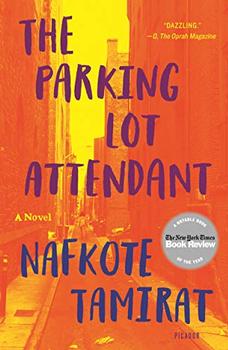Summary | Excerpt | Reading Guide | Reviews | Beyond the Book | Readalikes | Genres & Themes | Author Bio

A Novel
by Nafkote TamiratON THE SUBJECT OF HOW WE MET AYALE
On my fifteenth birthday, my father gave me permission to travel to and from school on my own. This news was delivered as a gift-wrapped-with-trust privilege, but it didn't escape me that this also meant he no longer had to drop me off or pick me up. I didn't mind. I knew that he needed to be alone and still for as long and as frequently as possible.
My father worked in various public high schools, fixing mechanical mishaps that could blossom into full-on catastrophes at any moment. He liked this job because it required almost zero contact with other human beings. An administrator would call into the service whose employ he was in and, when my father arrived, would recount the nature of the issue by repeating phrases that included, but were not limited to, "it wasn't my fault," "it just happened," "maybe we should replace the whole damn thing." My father would nod and wait patiently until left alone to determine what had actually occurred.
Despite long hours alone in his car, on the job, in the car again, my father still had to contend with the fact that he had a live person to feed, clothe, and sign report cards for. Weekends were torture; I could see it in his face. He would stare helplessly as I moved around the small space, asking if we could go to the movies, the park, someplace that served food I liked, which was a rare thing. He wouldn't let me out alone because as much as he wished he could put me to sleep for specific hours of the day, he never could have lived with the guilt of something happening to me. We are similar in this way: by caring too much about what might happen in the future, we end up caring not enough in the present, too worn out to maintain that kind of attention, no matter how genuine. On those long-ago weekends we would sit in silence in the apartment, reading or watching sitcoms on our small television set (he didn't encourage laughter but could stand it if I insisted). I would follow his progress as he heated up coffee or smoked and wonder how it was possible that we were here, together, in this place.
On the birthday of my transport liberation, we went to the arboretum. He sat on a bench, I halfheartedly biked up and down a few paths, we had a slice each of the Carvel cake that had been melting next to him, because he'd forgotten that I was too old for ice cream cake, we went home, he presented me with a T pass for the month, we watched the only Robert Redford movie he could stand (Three Days of the Condor, a classic), we went to bed.
Public transportation made punctuality a thing of the past since the truth of tardy trains and delayed buses was irrefutable. After school, I would go to Jamaica Plain to explore dusty thrift stores and brunch-all-day cafés, sneak into movies at Copley, watch pretty waifs at the Common perform original songs available on the CDs in their open guitar cases. I learned how to navigate the city in which I had been living for more than a decade. I was confused by the intersection of Tremont and Tremont; I watched men kiss on the mouth in the South End, but my father said that I must have made a mistake; I ate Vietnamese food in Chinatown, which made me sneeze; I got a free ticket to the Wilbur Theatre's production of Hamlet, which the Globe called unconventional because the lead was fat but thank God he was British.
It was a Friday afternoon when I exited the Park Street station, eyeing the hot pretzel carts, for which I had no money because my allowance never lasted past Wednesday. I had reached the parking lot near the hat store from which my classmate Seth Taschen would later be banned when he politely asked the saleswoman if they sold hats. I was just about to double back when Amharic stopped me.
"On the one hand, he wanted his mother to like her, but on the other hand, he wanted the girl to like him."
Excerpted from The Parking Lot Attendant by Nafkote Tamirat. Copyright © 2018 by Nafkote Tamirat. Excerpted by permission of Henry Holt and Company. All rights reserved. No part of this excerpt may be reproduced or reprinted without permission in writing from the publisher.
If we did all the things we are capable of, we would literally astound ourselves
Click Here to find out who said this, as well as discovering other famous literary quotes!
Your guide toexceptional books
BookBrowse seeks out and recommends the best in contemporary fiction and nonfiction—books that not only engage and entertain but also deepen our understanding of ourselves and the world around us.